To fight against COVID-19, most of the governments are allocating a significant portion of their health budget for health safety equipment, COVID-19 testing machines, and kits, etc. while mental health issues due to COVID-19 are mostly ignored in almost every country. To control the pandemic, governments have imposed several restrictions on travel, public gathering, which makes social distancing almost mandatory. These restrictions worsen the situation in developing countries of Asia and Africa, where mental health professionals and services are scarce. This article will discuss an innovative e-health service ‘Mind Tale’ for providing mental health services while addressing the resource scarcity and social distancing issue in the pandemic. It will also describe the unique service delivery model of Mind Tale, which make its potentials role model for other developing countries to provide mental health support despite the existing digital divide.
Till date, COVID-19 has affected the lives of millions, and with time the death toll is increasing, so as the economic downturn. Though it seems like this pandemic is distressing the physical health of human beings, what we cannot neglect is rising of mental health issues due to COVID-19. During epidemics, distressing experiences stimulate behavioural responses which can propel psychosocial distress, psychiatric disorders, stigma and social issues. According to a recent KFF poll, nearly half (45 per cent) of the adults in the United States stated that their mental health had been impacted due to worry and stress over the virus. Experience of the past pandemic situations of SARS and Ebola indicated that this pandemic is also going to have long-term implications on mental health.
But, in most of the developing countries, the availability of mental healthcare professionals is inadequate and so as the allocated budget for mental healthcare. On top of that, in response to the COVID-19, the World Health Organisation (WHO) has strongly recommended ways to minimise physical contact between patients and healthcare providers to maintain social distancing whereas mental health services require hours of psychotherapy and counselling sessions. Now, these countries have to fight simultaneously with mental health and other health issues while maintaining social distance measures to keep the people safe.
Providentially, there exist e-health and telehealth services which can play a significant role in the pandemic, especially for developing countries. Telehealth, which is a subset of e-health, can provide health-related services and information via electronic and telecommunication technologies for distance patients and can provide easier access to health facilities for mass people. This article discusses the competences of telehealth in COVID-19, and presents ‘Mind Tale’ as a prominent solution to provide distant mental health service during COVID-19. Mind Tale is a 24/7 accessible telehealth solution operating in Bangladesh with a unique service delivery model which is ensuring quality health services despite the existing digital divide and has enormous potentials to be a role model for the developing countries.
Bangladesh, a developing country in the South Asia region, emerged as a rapidly developing economic power with a population with 18 crore people. According to the WHO & Ministry of Health & Family Welfare of Bangladesh, nearly 17 per cent of adults in Bangladesh are suffering from mental health issues. Among them, 92.3 per cent do not seek medical attention due to stigma (Figure 1). Every year more than 10,000 people commit suicide, and among them the majority are young women. But unfortunately, there is only one psychiatrist or mental health expert perone million people who are mainly concentrated in two megacities.

Considering all the limitation and facts, the e-health solution ‘Mind Tale’ was designed and implemented. ‘Mind Tale’ is a psychologists and psychiatrists based mental health helpline and information dissemination platform with multi-domain service delivery model. The effectiveness of the service is promising for improving the bottom line in COVID-19 by providing remote care for patients while saving time and cost. With the help of this telehealth service, health professionals are able to serve people from rural areas inconsiderate of their local presence. This section depicts the service delivery model and other important aspects of Mind Tale.
Mind Tale’s multi-disciplinary approach over the phone with different kinds of professionals can instantly facilitate required mental care for a person. The workforce of Mind Tale has clinical psychologists in the 1st level, psychiatrists, along with counselling and education psychologists in the 2nd level (Figure 2). Furthermore, a medical board is formed with experts to take care of the most critical cases. Roundthe-clock availability of the service with two-way communication technology makes it more potential for people with mental health issues which gets worst in the night when no one available for sharing their mental troubles. The standard operating process and service delivery guideline are designed as per the mental health guideline DSM 5 (The Diagnostic and Statistical Manual of Mental Disorders, Fifth Edition by the American Psychiatric Association’s) to provide quality mental healthcare.

Mind Tale has an inclusive service design and delivery platform which consists of an Integrated Patient Record System with Voice, SMS and Video Calling Systems along with Health CRM, Content Management System. e-Prescription, Referral System, call transferring options provides this service more robustness. This integrated solution enables the health care providers to deliver quality health care service and experience to the end-users. A simple architecture of this complex system is depicted in Figure 3.
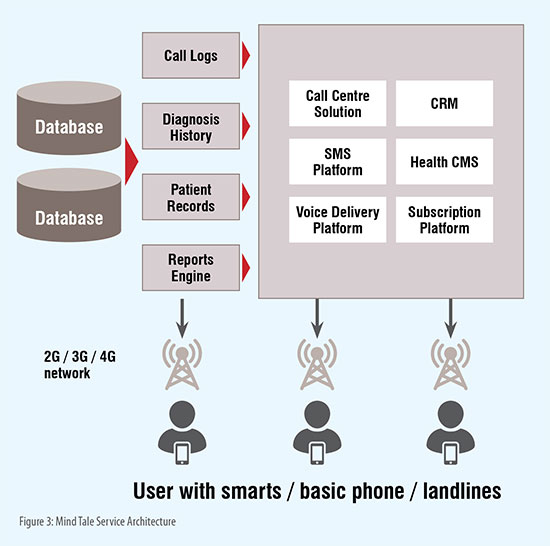
One of the biggest obstacles for mental health service is gaining the trust of the patients and ensuring their privacy, especially for the rural population where stigma prevents to seek help from the professionals. The appealing feature of Mind Tale service is that here people can talk over the phone and their identity remains confidential, which is very crucial, especially for vulnerable groups like children and women. When a patient is calling, the call automatically triggers the patient’s previous health records if available. At this stage, the service provider can view the patient’s record, but all personal data and caller identification and phone numbers are kept hidden. Moreover, all confidential personal information is kept in a secure database with proper encryption. Additionally, advanced network and system security architecture is incorporated to prevent all internal and external security threats.
The system design of Mind Tale consists of simple user access protocol to ensure availability of the service especially for women, adolescents, disabled people, low-income groups, illiterate or uneducated people, also for people living in rural areas. The service is designed to reach to rural people where every household has at least one mobile phone. Professional service of Mind Tale can be avail through any basic phone over 2G/3G network, and it does not have any dependency on the mobile handset, network, operating system or location.
Just dialling a 3 or 5-digit short-code by any phone people can access this service and take counselling from experts. As a result, the service has an extraordinary acceptance rate among rural people and females. Mind Tale has urban and rural service users’ ratio as 64 per cent and 38 per cent respectively, and male and female service users’ ratio as 68 per cent and 32 per cent respectively (Figure 4).
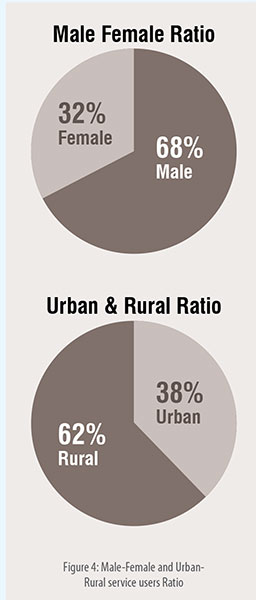
With the rising number of COVID-19 affected people, COVID-19 related mental health issues such as stigma, depression, anxiety disorders, etc. are also increasing. The before and after call pattern analysis shows us how COVID-19 is affecting people’s mental health issues in Bangladesh (Figure5). The pattern shows the percentage of mental disorders related call has decreased dramatically, whereas the rate of all other services has increased during the pandemic. Concern related to education and career has risen by 1 per cent, which resembles the current economic downturn and lockdown situation. The graph also shows 7 per cent of people took service for COVID-19 related stress and calls due to sickness or death of closed ones increased from 7 per cent to 14 per cent in this epidemic. There is a significant rise in calls related to relationship issues and psycho-sexual problems.
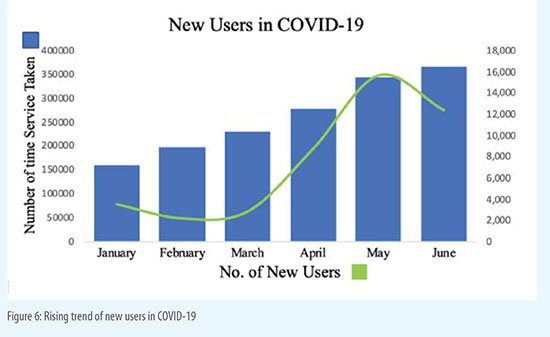
When COVID-19 started spreading in Bangladesh at the end of March, the new user of the service has been increased extensively so as the number of services taken from Mind Tale (Figure 6). The pandemic hit Bangladesh officially on 8th March of 2020; right after that new caller started taking the service, which changed the previous trend of new users’ engagement to this service. This trend indicates that due to the epidemic when people are required to stay at home for maintaining social distance, they prefer telehealth over regular mental healthcare.
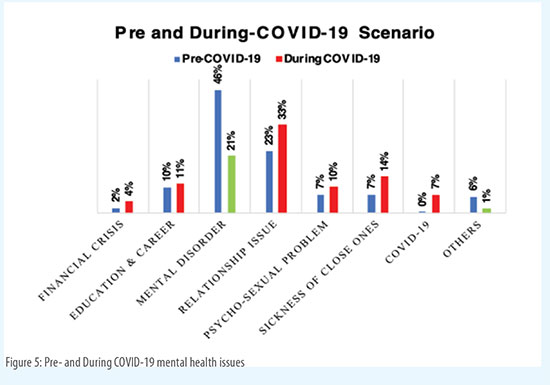
A random survey was conducted on randomly chosen 413 new users, who used the Mind Tale service during COVID-19 for the first time, to understand why people were choosing telehealth in this pandemic.The survey results revealed, people who are stuck at home due to COVID-19 had availed this service most, and easier access to the service from anywhere and anytime intrigued them to take this service (Figure 7). Other prominent reasons were privacy issue and unavailability of mental health experts nearby. Mind Tale provided the opportunity to get help though telephone, which is very much required during the pandemic as people needed the help of an expert while maintaining social distance. Moreover, 24-hours of professional’s availability make this service more appropriate for persons who hesitate to seek for help physically.
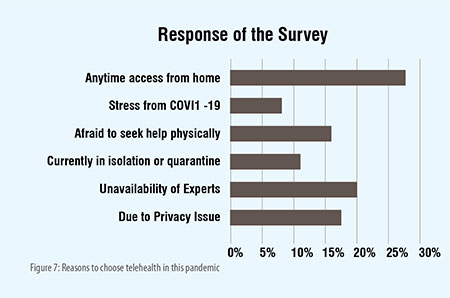
Conclusions
In COVID-19, mental trauma, anxiety, distress, anger, depression etc. are evident. Also, mental disorders might get worsen if treatments are not time on time. However, due to social distance measures, face-to-face therapy and diagnosis are not possible at this moment. In this context, telehealth provides the opportunity to serve unmet health needs for professional resources in developing countries, aided by advancing capabilities of an everevolving and universal technology and the promise to improve the bottom line of the mental healthcare in several ways. Engaging different professionals from different domains improves the chances of more effective diagnosis and treatment. Furthermore, the use of emerging IT and telecommunication technologies in telehealth expands the reach of mental health professionals to a widely spread patient population, especially in rural areas. Using previous records of patients and knowledgebase available in telehealth, professionals can provide individual case basis personalised quality healthcare.
The telehealth solution Mind Tale containing all the features as mentioned above has already proven to be a great alternative to provide mental health support during the breakout of this epidemic Bangladesh. Though limitation exists for people with cognitive disabilities, still e-health or telehealth services such as Mind Tale can be an example for other developing countries with similar socio-economical and health infrastructure context.
Data sources: Data of Mind Tale service for the article was collected from Synesis IT Ltd., thus gratefully acknowledged.